Key takeaways:
- Home automation technology enhances convenience, security, and efficiency by allowing remote control of various devices.
- A robust security system provides peace of mind and deters potential threats, fostering community vigilance.
- Regular maintenance, including software updates and battery replacements, is essential for optimal security system functionality.
- Upgrading technology, such as integrating AI and centralized systems, can significantly improve security and simplify daily routines.
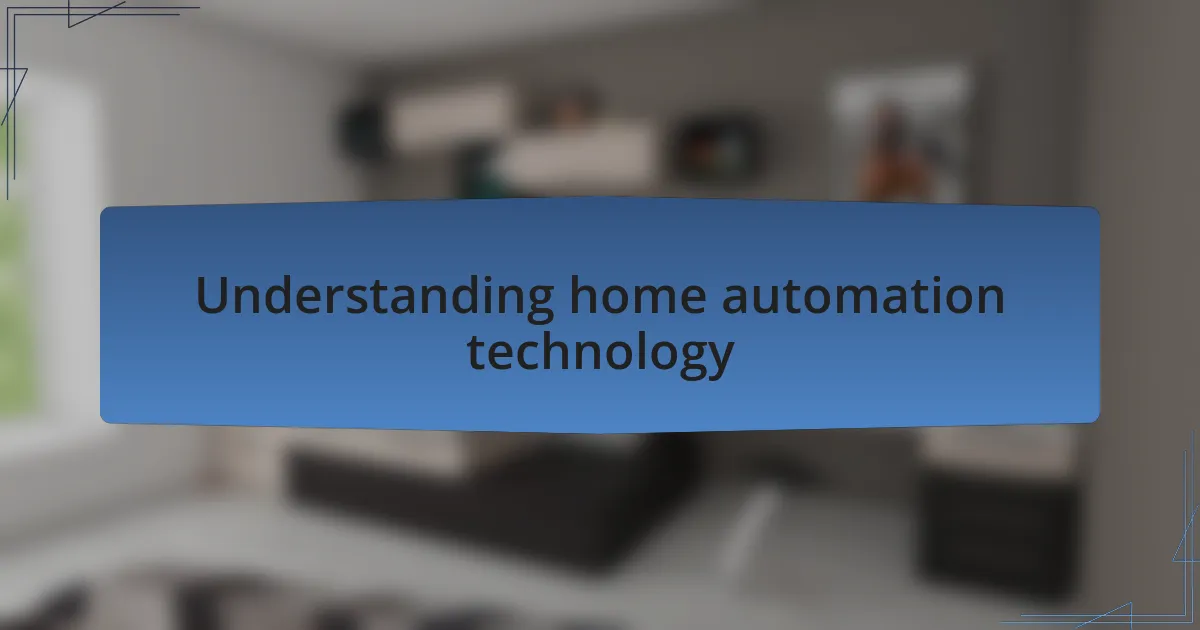
Understanding home automation technology
Home automation technology simplifies our daily lives by integrating various devices and systems that can be controlled remotely. I remember the first time I set up my home hub; it felt like stepping into the future. Isn’t it fascinating how we can manage our lighting, climate, and security all from our smartphones?
This technology isn’t just about convenience; it enhances security and efficiency in our homes. I once left my house for a weekend trip, and a quick glance at my security app reassured me that everything was under control. Can you imagine the peace of mind knowing that you can check on your home anytime, anywhere?
Moreover, understanding home automation involves recognizing how these systems communicate with each other. Each device, whether it’s a smart thermostat or a security camera, works in harmony, creating a seamless experience. There was a time when I struggled with managing multiple apps; then I found an all-in-one solution that truly transformed how I interacted with my home environment. Doesn’t it feel empowering to have everything at your fingertips?
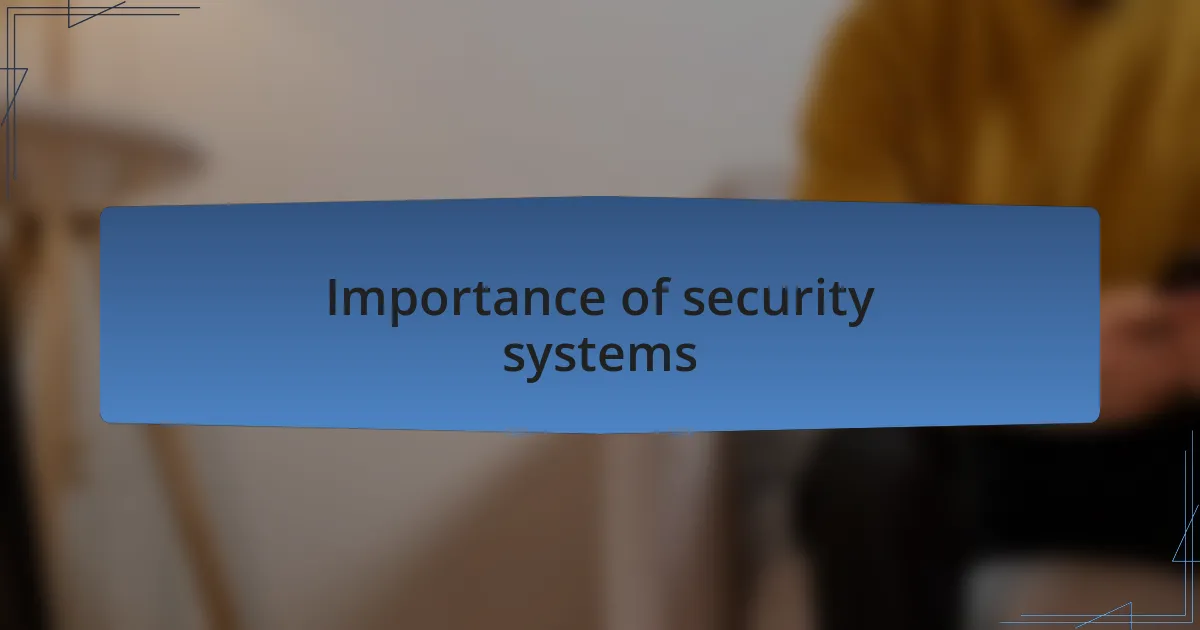
Importance of security systems
A robust security system is crucial for providing peace of mind in our increasingly unpredictable world. I can’t tell you how many times I’ve felt a surge of relief, knowing that my home is safeguarded by smart cameras and motion detectors. It’s reassuring to think that a simple alert on my phone could signal an intrusion and give me the opportunity to act swiftly.
Having a reliable security system not only protects our home but also enhances our overall quality of life. Just last month, I had a situation where my doorbell camera caught a delivery person leaving a package on my porch, which I would have otherwise missed. Isn’t it comforting to feel connected and informed about what’s happening even when I’m not around?
Furthermore, the importance of security systems goes beyond protection; they help deter potential threats. I remember how neighbors started investing in their own surveillance systems after an uptick in local crime. The collective effort fostered a sense of community vigilance. Don’t you find it empowering when everyone bands together to ensure safety?
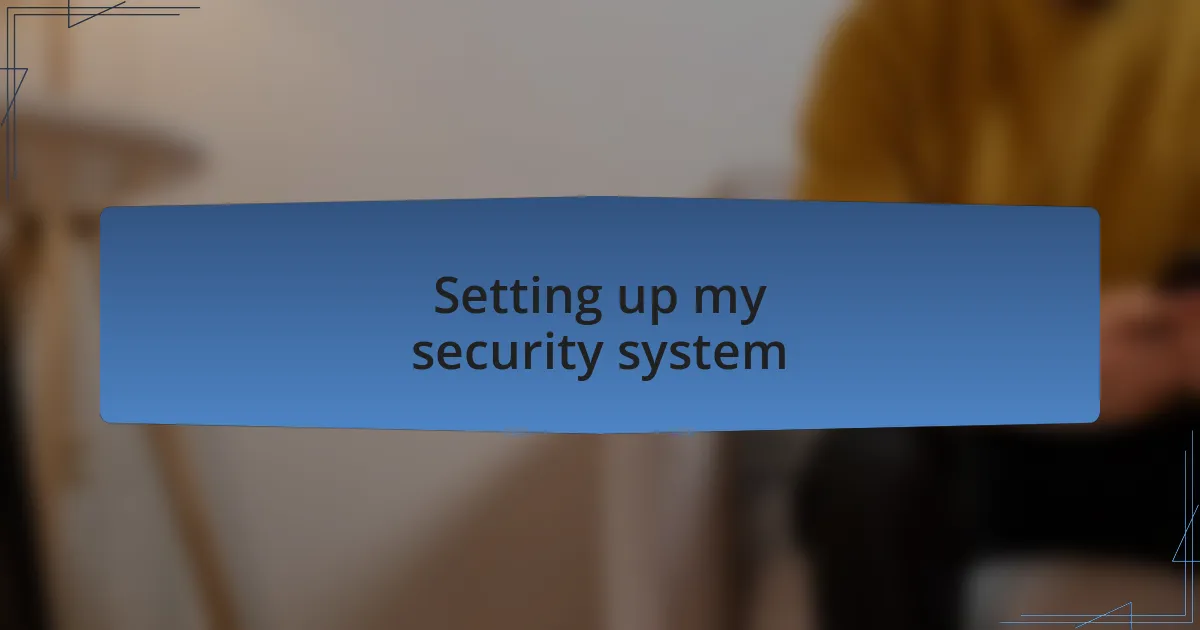
Setting up my security system
Setting up my security system was both exciting and a bit daunting at first. I remember unboxing everything and feeling a rush of anticipation, thinking about the layers of protection it would add to my home. Carefully following the manufacturer’s guidelines, I installed the cameras and sensors, making sure to place them where they could catch every corner without obstruction.
I found that the location of each device was crucial. For instance, I positioned the outdoor cameras at angles where they could monitor driveways and entry points, and I was pleasantly surprised by how much peace of mind that brought me. I still recall the satisfaction of watching the live feed for the first time, feeling empowered as I could check on my home from anywhere. Can you imagine being away and still having that sense of control?
Connecting everything through my home automation hub took some patience, but it was worth every minute. I vividly remember troubleshooting a few hiccups along the way—like when my motion sensors initially failed to sync—and I felt proud once I overcame those challenges. Each time I received a notification of activity or activated my system remotely, I couldn’t help but smile, knowing I had taken important steps toward securing my sanctuary.
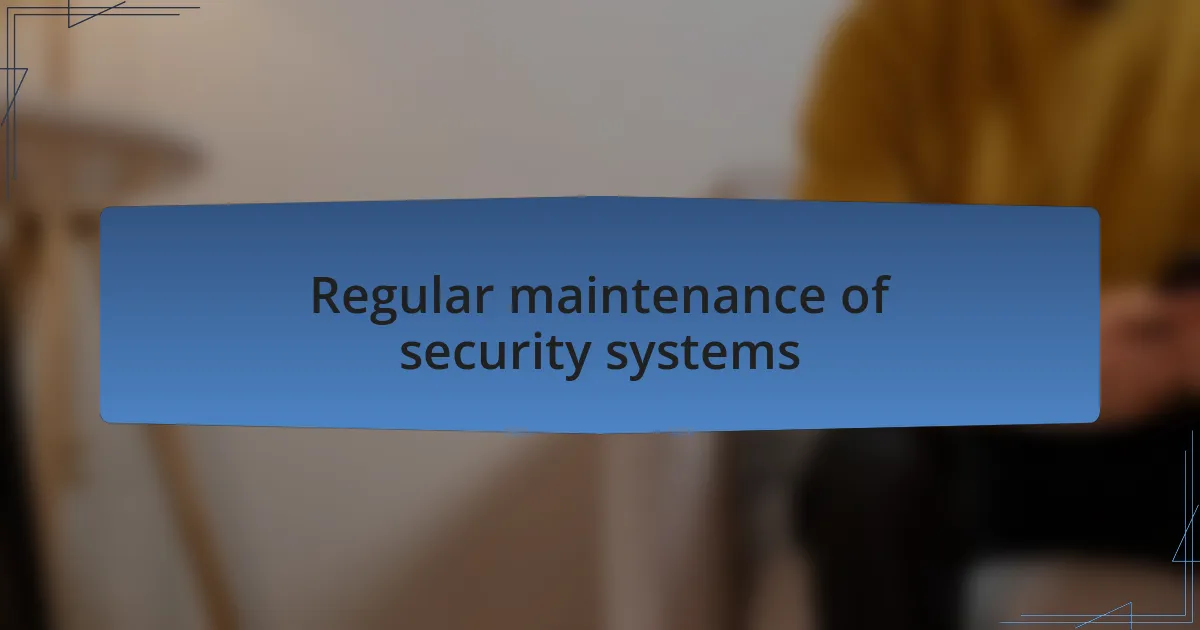
Regular maintenance of security systems
Maintaining a security system isn’t just about installation; it’s an ongoing commitment. For example, I schedule routine check-ups to test the functionality of my cameras and alarms. The last time I did this, I uncovered that one of my outdoor cameras had shifted just enough to miss a critical viewing angle. Would I have noticed that without regular maintenance? Probably not.
I also pay close attention to software updates. It’s unbelievable how many security improvements come out with these updates. I remember a time when I hesitated, thinking I could skip it, only to realize later that a new feature could enhance my home’s security by allowing smarter motion detection. It’s those small updates that make a significant difference over time.
Battery replacements are another element that can’t be overlooked. For instance, I learned the hard way when a sensor died suddenly, leaving a blind spot. After that, I set a reminder every six months to check and replace batteries if needed. It’s a small effort that pays off in ensuring my home remains secure.
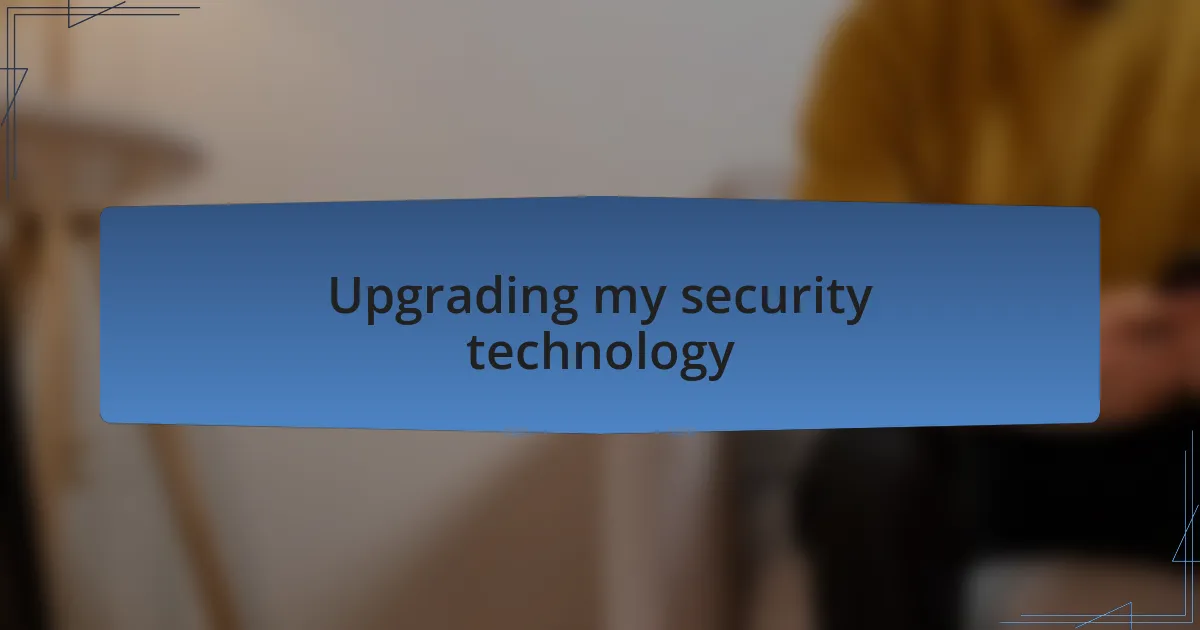
Upgrading my security technology
Upgrading my security technology is an essential part of staying ahead in today’s evolving landscape. Recently, I decided to invest in a more advanced doorbell camera. The difference was immediate; the new model offered high-definition video, night vision, and even facial recognition. No more squinting at grainy footage—I can see exactly who’s at my door, and that peace of mind is priceless.
I’ve also discovered the importance of integrating security devices into a centralized system. For example, I recently connected my smart locks to my home’s alarm system. Now, if I forget to lock the door, an alert pops up on my phone. It’s amazing how these upgrades not only enhance security but also simplify my daily routine. Have you thought about how technology can help remind you of important tasks?
Then there’s the role of artificial intelligence in security technology. I was initially skeptical about how smart cameras could distinguish between a friend and a stranger, but after upgrading to a model that incorporates AI, I was pleasantly surprised. The system sends me alerts only when it detects unfamiliar faces, which minimizes false alarms. It’s these types of innovations that make upgrading your security not just necessary, but exciting.
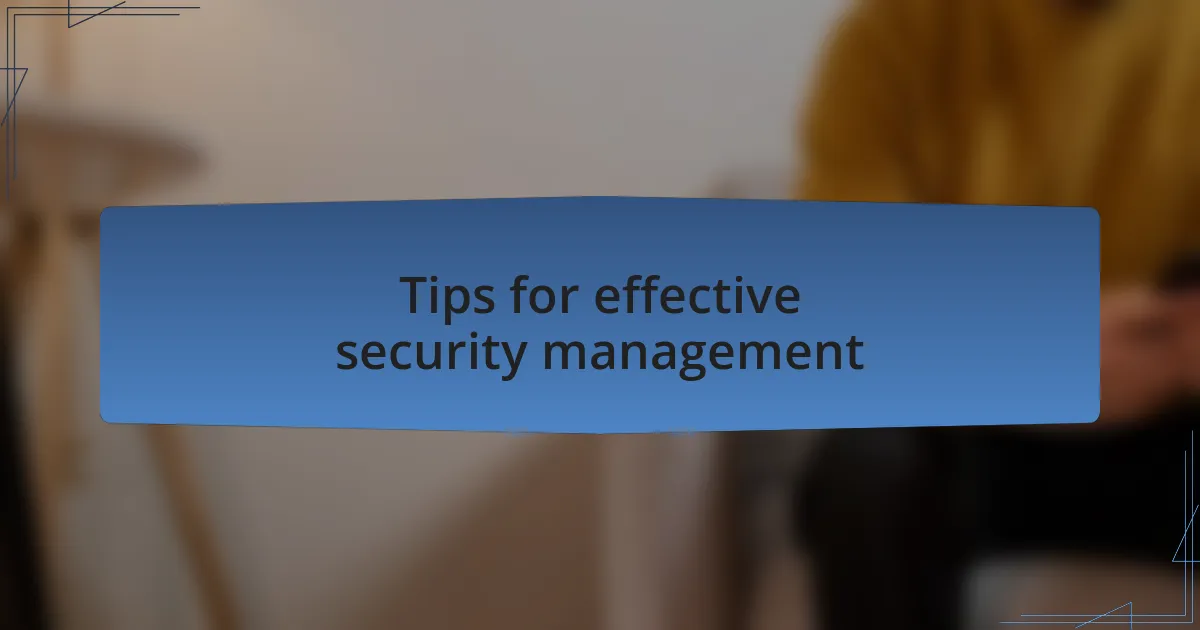
Tips for effective security management
Managing a security system effectively requires consistency and attention to detail. One of my favorite strategies is to routinely update the software of all my security devices. I remember when I neglected this for a few months and ended up missing crucial updates that could improve the performance of my cameras. It was a lesson learned—keeping everything up to date not only enhances security but also ensures that I’m getting the full benefits of the technology I’ve invested in.
In addition to software updates, I advocate for regular check-ins on the system’s physical components. I once discovered that my outdoor camera was slightly misaligned after a storm—and it had been recording only a fraction of what it should have been capturing. I like to schedule monthly walkthroughs of my property, making sure every device is working optimally. This practice has helped me identify vulnerabilities before they escalate into potential issues.
Lastly, consider utilizing features like automatic notifications to stay proactive about your home security. Whenever my alarm system detects movement, I receive an instant alert, which puts me at ease. Have you looked into similar features? Having real-time information empowers me to act quickly, whether it’s just a squirrel in the yard or something more concerning. Being engaged in these aspects of security management keeps my home safe and allows me to sleep soundly at night.